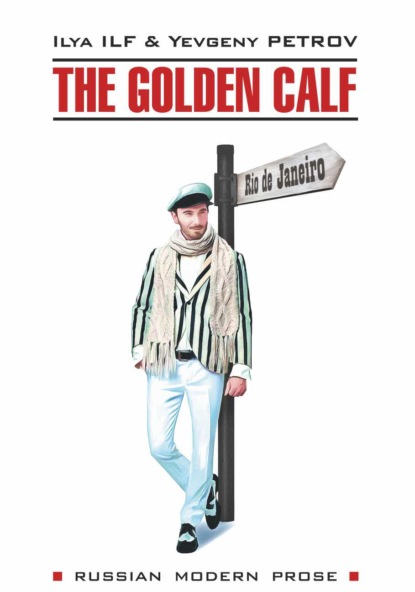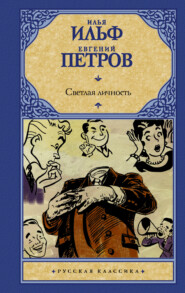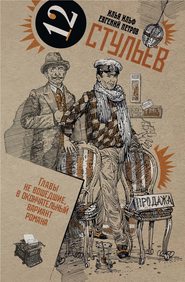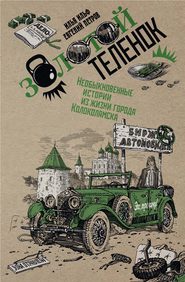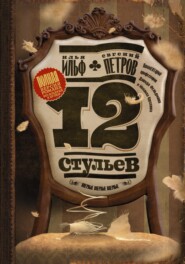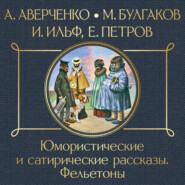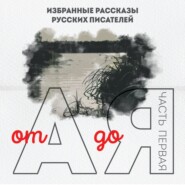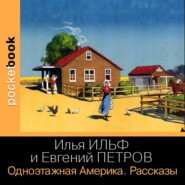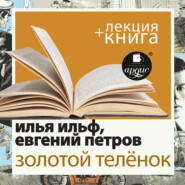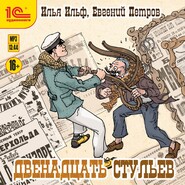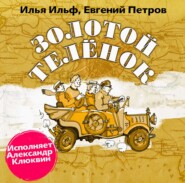По всем вопросам обращайтесь на: info@litportal.ru
(©) 2003-2024.
✖
Золотой теленок / The Golden Calf
Автор
Жанр
Серия
Год написания книги
1931
Теги
Настройки чтения
Размер шрифта
Высота строк
Поля
A gray hard-top Cadillac was parked on the shoulder, listing slightly. The landscape of central Russia was reflected in its thick shiny windows, looking neater and more scenic than it actually was. The driver was on his knees, taking the tire off a front wheel. Three figures in sand-colored travel coats hovered behind him, waiting.
“Your ship’s in distress?” asked Ostap, tipping his cap politely.
The driver raised his tense face, said nothing, and went back to work.
The Antelopeans climbed out of their green jalopy. Kozlevich walked around the magnificent vehicle several times, sighing with envy. He squatted down next to the driver and struck up a technical conversation. Panikovsky and Balaganov stared at the passengers with childlike curiosity. Two of the passengers had a rather standoffish, foreign look to them. The third one was a fellow Russian, judging by the overpowering smell of galoshes coming from his State Rubber Trust raincoat.
“Your ship’s in distress?” repeated Ostap, politely touching the rubber-clad shoulder of his fellow countryman, while at the same time eyeing the foreigners pensively.
The Russian started complaining about the blown tire, but his grumbling went in one of Ostap’s ears and out the other. Two plump foreign chicklets were strolling around the car – on a highway some eighty miles from the nearest town of any significance, right in the middle of European Russia. That got the grand strategist excited.
“Tell me,” he interrupted, “these two wouldn’t be from Rio de Janeiro, by any chance?”
“No,” said the Russian. “They’re from Chicago. And I am their interpreter, from Intourist.”
“What on earth are they doing here in this ancient wilderness in the middle of nowhere? So far from Moscow, from the Red Poppy ballet, from the antique stores and Repin’s famous painting Ivan the Terrible Kills his Son? I don’t get it! Why did you drag them out here?”
“They can go to hell!” said the interpreter bitterly. “We’ve been racing from village to village like mad for three days now. I can’t take it any more. I’ve dealt with foreigners quite a bit, but I’ve never seen anything like this.”
He waved in the direction of his ruddy-faced companions.
“Normal tourists run around Moscow, buying handmade wooden bowls in gift shops. But these two broke away and went driving around the back-roads.”
“That’s commendable,” said Ostap. “America’s billionaires are learning about life in the new Soviet countryside.”
The two citizens of Chicago looked on sedately as their car was being repaired. They wore silvery hats, frozen starched collars, and red matte shoes.
The interpreter looked at Ostap indignantly and blurted out:
“Yeah, right! Like they need your new countryside! They need the country moonshine, not the countryside!”
Hearing the word “moonshine,” which the interpreter had stressed, the two gentlemen looked around nervously and edged closer.
“See!” said the interpreter. “Just hearing the word gets them all excited.”
“Interesting. There’s a mystery here,” said Ostap. “I don’t understand why one would want moonshine when our native land offers such a large selection of superb hard liquors.”
“This is much simpler than you think,” said the interpreter. “They’re just searching for a decent moonshine recipe.”
“Of course!” exclaimed Ostap. “Prohibition! I get it now… So have you found a recipe? Of course not. You might as well have shown up in a three-car motorcade! Obviously, people think you’re officials. I can assure you that you’ll never find a recipe this way.”
The interpreter began to complain about the foreigners again.
“You won’t believe it, but they’ve even started pestering me: ‘Just tell us the secret of the moonshine!’ For God’s sake, I’m not a moonshiner. I’m a member of the education workers’ union. I have an elderly mother in Moscow.”
“And how badly do you want to go back to Moscow? To be with your mother?”
The interpreter sighed dejectedly.
“In that case, our deliberations continue,” declared Ostap. “How much will your bosses pay for a recipe? 150, perhaps?”
“They’ll pay two hundred,” whispered the interpreter. “Do you really have a recipe?”
“I can give it to you this very moment – I mean, the moment I get the money. Made from anything you want: potatoes, wheat, apricots, barley, mulberry, buckwheat. One can even brew moonshine from an ordinary chair. Some people enjoy the chair brew. Or you can have a simple raisin or plum brew. In other words, any of the 150 kinds of moonshine known to me.”
Ostap was introduced to the Americans. Their politely raised hats floated in the air for a long time. Then they got down to business. The Americans chose the wheat moonshine – the simplicity of the brewing process appealed to them. They painstakingly recorded the recipe in their notebooks. As a bonus, Ostap sketched out a design for a compact still that could be hidden in an office desk. The seekers assured Ostap that, given American technology, making such a still would be a breeze. For his part, Ostap assured the Americans that the device he described would produce two gallons of beautiful, fragrant pervach per day.
“Oh!” cried the Americans.
They had already heard this word in a very respectable home in Chicago, where pervach was highly recommended. The man of the house had been in Archangel, with the American expeditionary force. He drank pervach there and never forgot the alluring sensation that it gave him.
On the lips of the enchanted tourists, the crude word pervach sounded both tender and enticing.
The Americans easily parted with two hundred rubles and endlessly shook Bender’s hand. Panikovsky and Balaganov also got to shake hands with the citizens of the transatlantic republic, who had been suffering under Prohibition for so long. The interpreter was thrilled; he pecked Ostap on his cheek and invited him to stop by, adding that his elderly mother would be delighted. For some reason, however, he neglected to give his address.
The new friends climbed into their respective cars. Kozlevich played a farewell maxixe, and to the accompaniment of these cheerful sounds, the cars flew off in opposite directions.
“See,” said Ostap when the American car disappeared in a cloud of dust, “everything happened just like I told you. We were driving. Money was lying on the road. I picked it up. Look, it didn’t even get dusty.” And he crackled the stack of bills in his hand. “Actually, this isn’t much to brag about, a trivial job. But it was clean and honest, that’s what counts. Two hundred rubles in five minutes. And not only did I not break the law, I even did some good. I provided the crew of the Antelope with financial backing. The elderly mother is getting her son the interpreter back. And finally, I quenched the spiritual thirst of the citizens of a country that does, after all, maintain trade relations with us.”
It was almost time for lunch. Ostap immersed himself in the rally map that he had torn out of an automotive magazine and announced the upcoming town of Luchansk.
“The town is very small,” said Bender, “that’s not good. The smaller the town, the longer the welcoming speeches. So let’s ask our amiable hosts to give us lunch for starters and speeches for the second course. In the intermission, I will equip you with more appropriate gear. Panikovsky! You are beginning to neglect your duties. Return the banner to its original position.”
Kozlevich, who had become an expert in spectacular finales, brought the car to a dramatic halt right in front of the reviewing stand. Bender kept his remarks very short. They arranged to postpone the ceremonies for two hours. Fortified by a free lunch, the motorists were in high spirits, and they headed for a clothing store. They were surrounded by the curious. The Antelopeans carried the sweet burden of their new-found fame with dignity. They walked in the middle of the street, holding hands and swaying like sailors in a foreign port. The red-headed Balaganov, looking every inch the young boatswain, broke into a seaman’s song.
The store that sold clothing “For men, ladies, and children” was located under an enormous sign that covered the entire façade of the two-story building. The sign showed dozens of figures: yellow-faced men with pencil mustaches wearing winter coats whose open flaps revealed fitch-fur lining, women with muffs in their hands, short-legged children in little sailors’ suits, Young Communist League girls in red kerchiefs, and gloomy industrial managers sinking up to their hips in large felt boots.
All this splendor was ruined by a small hand-made sign on the front door:
OUT OF TROUSERS
“Ugh, how vulgar,” said Ostap, entering the store. “I can see that I’m in the provinces. Why don’t they say, ‘Out of trousers,’ like they do in Moscow? That would be proper and decent. The customers would go home satisfied.”
They didn’t spend much time in the store. For Balaganov, they found a canary yellow cowboy shirt with large checks and a Stetson hat with vent holes. Kozlevich got his calfskin cap, as promised, but had to settle for a black calfskin jacket, which shined like pressed caviar. Outfitting Panikovsky took much longer. They had to forget about the long pastor’s coat and the fedora, which Bender thought would give the violator of the pact a more refined look. The store’s only alternative was a fireman’s dress uniform: a jacket with golden pumps on its collar patches, fuzzy wool-blend pants, and a cap with a blue strap. Panikovsky jumped around in front of the wavy mirror for a long time.
“I don’t understand why you don’t like the fireman’s uniform,” said Ostap. “It’s certainly better than the exiled king outfit that you’re wearing now. Come now, turn around, my boy! Excellent! Let me tell you, this suits you much better than the coat and hat that I had in mind for you.”
They went outside in their new outfits.
“Me, I need a tuxedo,” said Ostap, “but they didn’t have any. Oh well, some other time.”
Ostap opened the ceremonies in a great mood, unaware of the storm that was gathering over the Antelopeans’ heads. He was witty; he told funny driving stories and Jewish jokes. The public loved him. The final portion of his speech was devoted to the analysis of pressing automobile-related issues. “The car,” he boomed, “is not a luxury but…” At that point he noticed a boy run up to the chairman of the welcoming committee and hand him a telegram. While still uttering the words “not a luxury but a means of transportation,” Ostap leaned to the left and glanced at the telegram over the chairman’s shoulder. What he read startled him. He had thought they had one more day. The long list of towns and villages where the Antelope had misappropriated materials and funds flashed through his mind.
The chairman was still wiggling his mustache, trying to digest the message, when Ostap jumped off the stand in mid-sentence and started making his way through the crowd. The green Antelope was waiting at the intersection. Fortunately, the other passengers were already in their seats. Bored, they were waiting for the moment when Ostap would order them to haul the town’s offerings into the car. This usually happened after the ceremonies.
When the chairman finally grasped what the telegram was saying, he raised his eyes only to see the captain of the rally running away.
“They’re con artists!” he shouted in agony.





